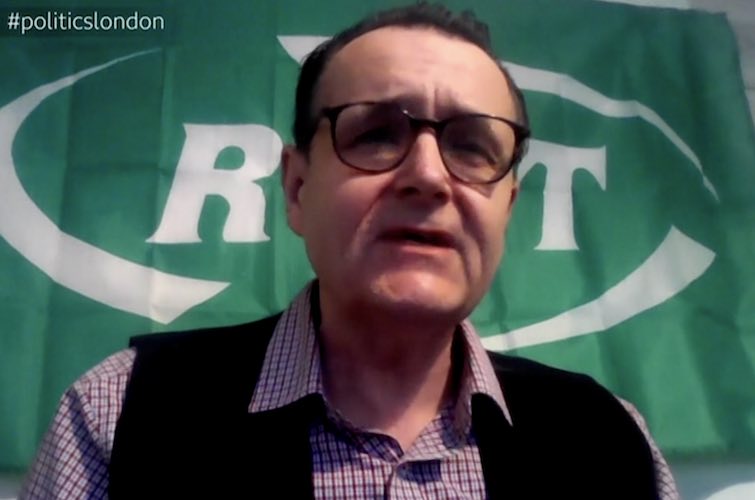Whatever your view of the Rail, Maritime and Transport union, you can’t say you don’t know what they’re after. Corbynite Leavers who were were disaffiliated from the Labour Party in 2004 because they insisted that local branches should be allowed to have links with far left parties instead, they are unabashed class warriors who use the bargaining power that comes with representing the majority of London Underground staff to improve and protect the pay and conditions of those members. They never pretend otherwise.
The union’s regional organiser for London, John Leach (pictured), spelled this out very clearly on Politics London when invited to apologise for last week’s strikes. “Our members are not going to lose their pensions, their jobs and terms and conditions of employment because of an argument between the Mayor of London and the government,” he said.
He shouldn’t bank on it. The RMT has surely twigged that the government and No 10 run TfL these days, having exploited Covid to force Tory priorities on a Labour Mayor they despise every bit as much as he despises them, using the bogus pretext that, in the words of Boris Johnson’s bare-faced lie to the House of Commons, the capital’s transport body was “effectively bankrupted” before the virus hit.
The eighth of the 53 paragraphs of conditions attached to the latest TfL funding “settlement” instructs TfL to provide its new masters in Whitehall with a plan for implementing “the explicit aim of moving TfL’s pension fund into a financially sustainable position” by the end of this month.
Perhaps what galls the RMT even more than the government’s attitude is that the Mayor might be quietly relaxed about this particular order from on high. Grant Shapps’s diktat document refers to the independent review Khan commissioned in July 2020 whose recommendations included reforms to the current scheme, saying these could save TfL £100 million a year (see page 31). Perhaps that’s what the RMT had in mind when accusing Khan of failing to “stand up” to the government. Perhaps it would sooner see the public pay much higher fares instead.
The strikes, then, might be best understood as a performative reaction from a union that knows it cannot win but wants to be seen to be making a fight of it. After all, it has its reputation to think of and doesn’t want to be losing members to rivals. Though rarely manifested in public, the dislike between the different unions representing TfL staff can be extreme.
This display of bravado has, of course, occurred within the larger context of the government’s comprehensive colonisation of TfL, which extends through every area of the supposedly devolved authority’s activities, from fares to how boroughs spend cash allocated for local street schemes.
On Politics London Leach complained that TfL management has refused to provide his union with assurances of no changes to pensions, pay and conditions. But how could it? TfL management is in no position to provide assurances on anything these days. Also, unlike the RMT, its responsibilities are to the whole organisation and capital city not limited to one section of its workforce
None of this is to say that had the Prime Minister and his courtiers chosen to respect London’s devolution settlement, instead of grabbing the opportunity to by-pass it for their own rag-bag of dishonourable reasons, industrial relations on the Tube would be all sweetness and light. But TfL is in financial trouble not because of Sadiq Khan’s policy choices but because the effects of Covid nearly killed it. The government’s determination to ensure that the symptoms are needlessly long does nothing to hasten a cure.
From Onlondon.com
Dave Hill: Tube strikes are a symptom of TfL’s long Covid

